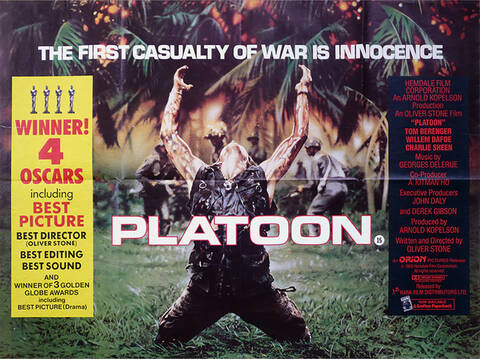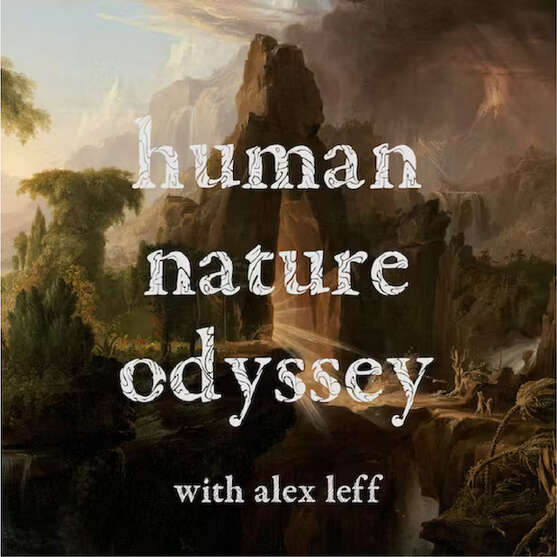This week’s selected media, March 9, 2025: Platoon, the Lord of the Rings film trilogy, Human Nature Odyssey podcast
This week I finished:

Platoon, directed by Oliver Stone: Let me give you context to what prompted me to watch this movie after so long. I don’t remember when I first watched it.
Before learning about sustainability, I thought technology would solve our problems. Mainly I thought fusion would, but along the way nuclear, solar, and wind seemed promising.
As I learned more about each, I learned that they didn’t work. Moreover, they accelerated the problems we hoped they would solve, like pollution, extraction, and depletion, as well as political problems like coercion and inequality. I prefer health, safety, security, liberty, freedom, community, and things like that, so I learned one by one that they wouldn’t work.
While creating slides for a presentation, thinking of how to represent how I felt mortally wounded with each rug pulled out from under me. It reminded me of Sargent Elias being shot like in the movie poster. He kept getting shot, trying to keep going, then getting shot more. It felt like what’s happening to us. We want to keep culture going, but everything we try, we just get shot again.
I watched the movie again to remind me of that scene. I was surprised how much more of Elias’s situation resonated with ours: He was sent by his government to what was once a paradise to help wreck it. To maintain the corrupt culture that sent him there, he had to kill the people, plants, and wildlife. His own teammate betrayed him and abandoned him for dead. He still lived. As people escaping watched from relative safety, he got shot over and over.
It also hit me how much the Barnes character, who said “I am reality,” resembled mainstream culture. We do what it takes to keep the machine going, not stopping ourselves to question the machine. We become experts at doing what it takes to maintain the system, lying to ourselves that we can’t do anything otherwise, we’re just trying to get by, and all the other rationalizations and justifications we’ve all heard and said. Yes, even the ones you’re thinking now.
We don’t have to become corrupted like Barnes, thinking we have to make things our way or everything will fall apart.
The Lord of the Rings film trilogy, directed by Peter Jackson from the books by J. R. R. Tolkien: I had watched these movies a long time ago too. It took me weeks to finish them. I got whatever versions the library had, which seem to have been extended cuts. The third one was four hours.
I think of the stories as recounting something of Tolkien’s culture exploring the world. In this light, though each other group was something nonhuman, like elves, orcs, hobbits, and so on, they represented how Tolkien saw other cultures, which is how humans see other cultures: different. Though he called all the other groups non-human, they represented other human groups.
In other words, it seems a racist, imperial view. I see Star Trek and its aliens this way too.
Since I saw the movies the first time, I’ve learned more empathy and saw movies like Yi Yi, in which every character is full and complex. The Lord of the Rings characters are two-dimensional in comparison. Sauron is just evil. Why? What motivates him?
Despite it being a tool of an evil character, the ring grew on me as the temptation to overpower others that would corrupt. It seems like addiction.
I’ve also learn to appreciate less needing to suspend disbelief. I prefer once per work of art. The armies just kept clashing on too great a scale, for example. Lovely special effects, but I value art less for pushing the limit on technology and more for it connecting to my life. I kept wondering how these armies could be supplied, kept going despite being only males, and related logistical concerns.
I know the movies were about special effects. I didn’t mind them. I just wish the story and characters, however above average for many movies, matched them.
The Human Nature Odyssey podcast, by Alex Leff: Last week I wrote about rereading Ishmael. As I follow up many works I finish by searching the web for whatever comes up on them, I found this podcast. Three-time podcast guest Tom Murphy has shared how the book affected him and I value Tom’s views.
I found the book didn’t live up to its hype. This podcast represented it well, though. It helps explore and work through the book. If you like Ishmael, or would like to like it more, I recommend this podcast.
Reminding you about my thoughts on the book Ishmael, It did what books on what cause racism do. It says our culture comes from past choices, but not what situations prompted making those choices and what choices they make. In the case of Ishmael, its author, Daniel Quinn, presents taker culture as if people just started taking and it led to a culture. We can explain those things. They didn’t just happen. I plan to cover it in my next book.
What prompted the changes matter if we want to change them more. Saying takers just started taking is like in race all those books say “there’s no such thing as race, but here’s what white people do,” as if their skin color made them act that way. Skin color didn’t. Specific material conditions did. Sorry to make you wait for my next book to learn the answer, but it’s more than what will fit in blog posts.

Read my weekly newsletter

On initiative, leadership, the environment, and burpees